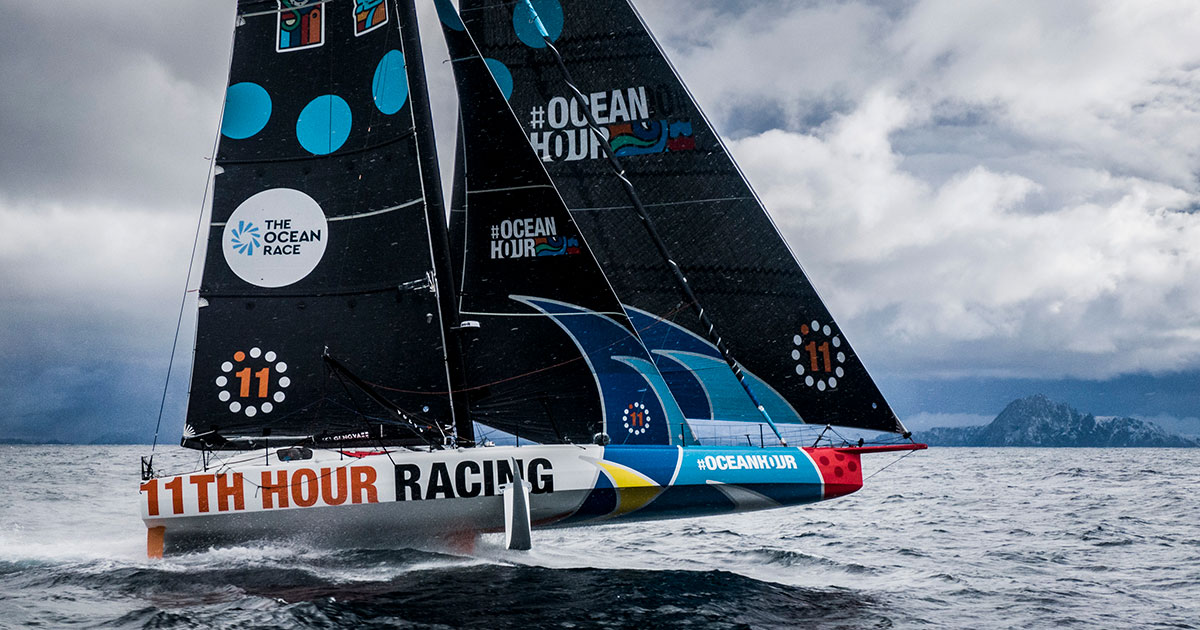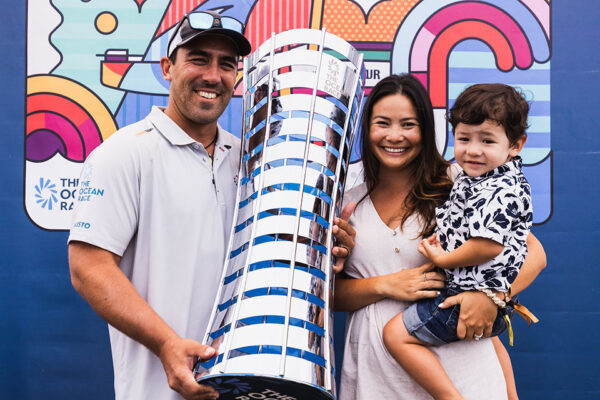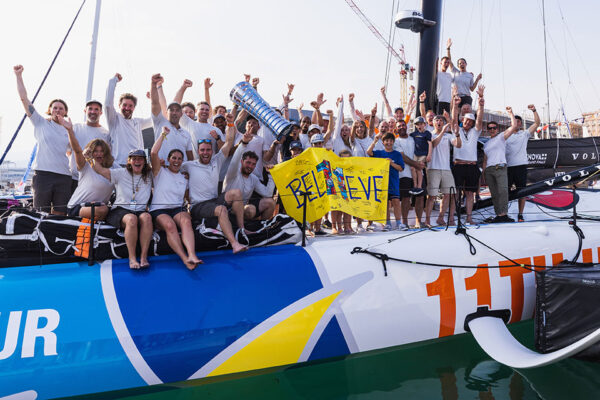The Entrepreneurial Spirit of Sailing Around the World

To sail around the world, as sailors do in the grueling Ocean Race, is a physically and mentally taxing marathon.
The five-month, 32,000-nautical-mile Ocean Race requires hard work, resilience, and the ability to handle heaps of stress. Sailors are crammed together in sleek boats built for speed and not for comfort. There is no kitchen, no heat or AC, no personal space.
“You are either too tired or too wet or too cold,” says Mark Towill MBA’23, the CEO and co-founder of the 11th Hour Racing Team, based in Newport, Rhode Island. “You learn a lot about yourself. I think being in the deep ocean is the best classroom. You find depths of energy and motivation.”
In June, the 11th Hour Racing Team won The Ocean Race, a prestigious achievement that Towill has been chasing for more than a decade. The win, however, wasn’t just about toughness and skill on the water. It took business prowess as well. To be a leader of a boat means building a team and putting them in the best position to win. That requires managing sponsorships, logistics, finances, sustainability initiatives, the design and construction of the boat, and a host of other things.
Towill attended Babson College to hone his knowledge. “This is a business and organizational challenge,” Towill says. “I view the whole team situation as a startup. You are basically running a startup company and running it at a high level.”
A Business at Its Core
Towill fell in love with sailing as a kid growing up in Hawaii. “You are 9 years old and in control of your own boat,” he says. “Sailing for me was just liberating. I felt a strong connection to the ocean.”
Long enamored by the challenge and adventure of The Ocean Race, Towill has competed in it three consecutive times. The first was during the 2014–2015 competition, a few years after he graduated from Brown University, where as an undergraduate Towill was on the sailing team.
Earning a spot in the race wasn’t easy. Towill didn’t consider himself an elite sailor, so his odds of joining an existing sailing team weren’t good. That meant he needed to find a sponsor and start his own.

“The best way for me to do this race was to build my own team,” he says. “I always felt a strong sense of entrepreneurship. To be a 22-year-old college graduate and put together a multimillion-dollar sports team is a pretty entrepreneurial endeavor.” He would go on to form another team for the 2017–2018 edition of The Ocean Race.
In both of those early races, Towill served on the crew of the boats while also performing his CEO duties. For the just completed Ocean Race of 2022–2023, however, changes in how the competition is conducted—in a nutshell, boats now had smaller crews, and teams were responsible for more of their own support—necessitated that Towill stay ashore and focus on his CEO responsibilities.
From hiring to marketing to accounting, there was plenty for him to do. In all, 35 people work in the organization, with only four sailing on the boat. “At its core, this is very much a business,” he says. “We have revenue in sponsorships, and we have expenses.” A key difference, though, is that the goal is not to maximize profits. The goal is to spend every dollar and maximize the performance of the boat.
Faced with growing business responsibilities, Towill decided to earn an MBA at a school known for its entrepreneurial spirit. “I wanted to refine all the experiences I learned on the fly in a more structured environment,” he says. “I was able to apply what I was learning in the classroom right away.”

What Next?
Towill may not have been a sailor on the boat, but that didn’t mean he could relax during the just completed Ocean Race. He had to ensure the boat was equipped with everything it needed across the race’s seven legs. The team had four 40-foot containers stocked with supplies, and one pair of those containers always had to be waiting for the boat to arrive at its next stop around the world.
Towill also was on stand-by to offer guidance in case anything unforeseen, say a broken rudder or sail, should happen on the boat’s arduous journey. “We have a crisis plan we follow,” he says. “At any moment, the boat could call me.”
Beyond its goal of winning The Ocean Race, the racing team was focused on sustainability, and it partnered with a sponsor—11th Hour Racing, an organization committed to protecting ocean health—that aligned with its values. “It is not enough to be a professional sports team,” Towill says. “You have to use your platform for a purpose.”
“This is a business and organizational challenge. I view the whole team situation as a startup. You are basically running a startup company and running it at a high level.”Mark Towill MBA'23, co-founder and CEO of the 11th Hour Racing Team
Among other things, that meant measuring the environmental impact of both building and operating a racing boat, as well as collecting climate data during the race for scientists to use. As the team made stops around the world, it also awarded grants to local environmental initiatives.
All of Towill’s work as CEO culminated with the team winning The Ocean Race in June. Finally, a goal he had been focused on for years had been achieved. “It still hasn’t entirely sunk in,” he says.
As joyful and satisfying as the win is, though, it does beg a daunting question: What next? What happens when a long-sought, all-consuming objective has been realized? “It will take some soul searching,” Towill admits. “I am at a big inflection point in my life.”
Whatever comes next, he believes it will still involve the sea. He also thinks about a key lesson in entrepreneurial leadership he learned at Babson. “One of the things that stuck with me most is that entrepreneurship is a method for solving problems,” he says. “As I think about what is next, I am looking at what problem to solve.”
Posted in Entrepreneurial Leadership, Outcomes




